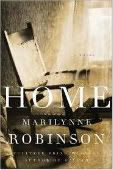
I used the word ‘imperishable’ here in this title because it is the word that most embodies the splendor and incorruptible eternality of our inheritance in Christ’s standing and also the rewards that are made possible by Christ’s great repute. However, for this novel it would have been just as fair of me to use the word “irresistible” and to good effect. That is the question here isn’t it? Can an inheritance of grace be resisted?
It would be true to say that this novel is a work that takes its aim at a profligate son, a prodigal. But where does Christ’s story of the prodigal son get its start? The story that Christ read as a young man, the story that set down roots in His heart is the story of Isaac, the son of Abraham, the father of Jacob and of Esau.
This novel “Home” is a story about inheritance, and how the claim inheritance makes on its benefactor can survive and be carried out in weakness. In the same way, the promises of God were carried down through the life of Jacob, the deceiver.
“Jacob was a quite man, dwelling in tents,” -Genesis 25:27b
"Jack had run a length of clothesline from beam to beam and thrown a tarp over it to make a low tent in the angle of the floor and roof…a soul that had improvised this crude tabernacle to stand in the place of other shelter…” –Marilynne Robinson, ‘Home’
Just as the Reverend Boughton would often pull Jack in close to get a good look at him, so did Isaac reach out to touch his sons. When Isaac's vision became “dim” as scripture puts it, he carried out his blessing by touching his son and, in that way, confirming on him his grace. So many times through out the novel Reverend Boughton longs to see Jack but can’t. “Is Jack here? I hope you find him, because it seems like I never even get a clear look at him,” He is the only child who truly had the Reverend's inheritance, and at the same time, the only child whom the Reverend could never completely see in order to bestow his blessing. This is why the reverend has no peace, because, although he has many children, he has not given his blessing to the one he intended to have it.
At the end of the novel we learn that the inheritance was given, and received. The young Robert receives the framed picture of the river and, like a fissure in a mountain, the line of grace runs back up through the entire novel, introducing and superimposing itself on every scene that felt deprived of it. Although the salvation moment happens off stage, it is made incarnate here in Jack’s son. Just as Jacob wrestled with God and was full of deceit, his true inheritance and election was made certain because he fathered the nations, and this is why the Lord is wonderful.
The lord is wonderful because even after the metal is cast, and the form is cooled, and there seems to be no hope, only an empty expectation to receive back from the mold that shape that was always cast into it, out comes something full of redemption and grace.

